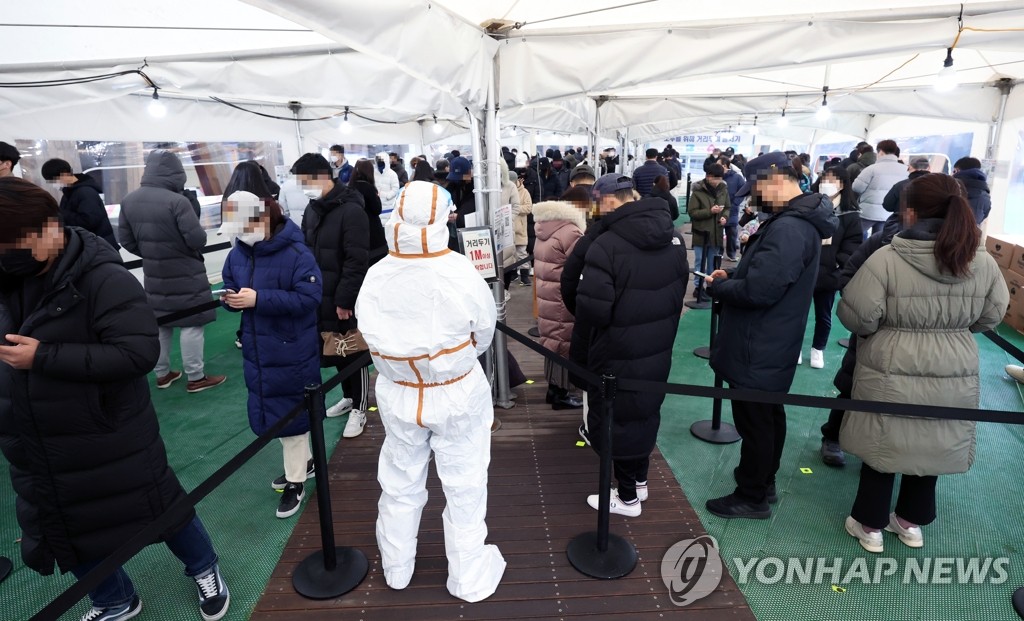- California Assembly OKs highest minimum wage in nation
- S. Korea unveils first graphic cigarette warnings
- US joins with South Korea, Japan in bid to deter North Korea
- LPGA golfer Chun In-gee finally back in action
- S. Korea won’t be top seed in final World Cup qualification round
- US men’s soccer misses 2nd straight Olympics
- US back on track in qualifying with 4-0 win over Guatemala
- High-intensity workout injuries spawn cottage industry
- CDC expands range of Zika mosquitoes into parts of Northeast
- Who knew? ‘The Walking Dead’ is helping families connect
S. Korea hits grim COVID-19 milestone of over 13,000 daily cases as omicron fears worsen
South Korea’s daily COVID-19 infections reached yet another grim milestone of over 13,000 on Wednesday as worsening fears over the rapid spread of the highly transmissible omicron variant continued to grip the country.
The country added 13,012 new cases, including 12,743 local infections, taking the total caseload to 762,983, the Korea Disease Control and Prevention Agency (KDCA) said.
The latest count is a big jump from Tuesday, when daily infections hit a record of 8,571 since the country reported the first COVID-19 case on Jan. 20, 2020. The daily figures have spiked from around 3,800 to over 7,500 since early last week.
The country reported 32 deaths from COVID-19, raising the total to 6,620. The fatality rate stood at 0.87 percent.
The number of critically ill COVID-19 patients dropped by seven to 385 from the previous day.
As of 6 p.m. Wednesday, the country had reported 10,164 new COVID-19 cases, up sharply compared to the 7,439 tally from the same time a day ago, according to health authorities and local governments. Daily cases are counted until midnight and announced the following morning.

People wait in line to take COVID-19 tests at a makeshift testing booth in Seoul’s eastern district of Songpa on Jan. 26, 2022. (Yonhap)
South Korea began to implement a new virus response system Wednesday to tackle the omicron variant, with a focus on minimizing critical cases and deaths, and preventing an overload and collapse of the medical system.
Under the regime, local hospitals and clinics will administer tests and treat patients, and rapid antigen tests will replace polymerase chain reaction tests at testing sites, except for those aged over 60 or high-risk groups.
“The spike in infections is definitely a point of concern, but we need to interpret the omicron crisis in terms of critical cases, deaths and medical system capacity, rather than the daily count itself,” Sohn Young-rae, a health official, said in a regular briefing.
He asked the public to not feel too anxious about the spike in the daily figure, saying the current virus response system is capable of handling the outbreak.
The system will initially apply in four areas seeing a surge in omicron cases — the southwestern city of Gwangju, South Jeolla Province, and the cities of Pyeongtaek and Anseong in Gyeonggi Province.
Starting Saturday, the system will expand nationwide, with the introduction of rapid antigen tests at 256 testing sites across the country.
Beginning Feb. 3, people will be able to take COVID-19 tests at designated local clinics.
The quarantine and at-home treatment period for vaccinated COVID-19 patients has been cut down to seven days from 10. A vaccinated person who comes into close contact with a COVID-19 patient won’t have to quarantine but needs to take a PCR test about a week after the initial contact.
Health authorities have warned the infections could surge to five-digit figures in the coming weeks, possibly topping 30,000 a day next month, should the current pace of the omicron spread continue.
The omicron variant became the new dominant COVID-19 virus strain in South Korea, 52 days after the first such case was reported.
Of the locally transmitted cases Wednesday, Gyeonggi Province that surrounds Seoul reported 4,184 new COVID-19 cases, followed by Seoul with 3,110 and the western port city of Incheon at 860.
The number of imported cases was tallied at 269, bringing the total to 24,234.
As of Wednesday, 25.78 million people, or 50.3 percent of the country’s 52 million population, had received booster shots, the KDCA said. The number of fully vaccinated people came to 43.87 million people, accounting for 85.5 percent.
The government also announced an additional batch of Pfizer Inc.’s Paxlovid antiviral COVID-19 treatment pills, enough for 11,000 people, will arrive in South Korea on Sunday.
Seoul has so far secured Paxlovid pills for 762,000 people and MSD’s Molnupiravir for 242,000 people. The first batch of Paxlovid, enough to be administered to 21,000, was delivered on Jan. 13.
South Korea received 770,000 doses of Pfizer vaccines Wednesday, raising the total amount of Pfizer vaccines delivered here at 2.46 million doses.











